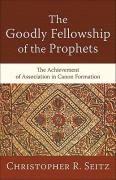
Just below the surface of any Christian view of the Bible is the knotty issue of the biblical canon. How and when was it decided which books would make up the Bible? What makes a book canonical?
Seitz challenges current understandings of the formation of the Christian canon, showing how the Old Testament fits into the canon's development. Utilizing the latest research on the biblical prophets, Seitz reveals canonical connections woven into the fabric of the Prophetic Books and argues that the Law and the Prophets cohere and give shape to the subsequent Christian canon.
"Seitz offers an alternative vision of the Old Testament: its structural logic, its internal relationships, its history of formation. The result is incisive, exhilarating, and quite constructively provocative. It will be read and discussed with much profit by theologians, biblical scholars, pastors, and seminarians."-- Stephen B. Chapman, Duke Divinity School.
"Seitz has made a major contribution to canonical studies. He argues that the common distinction between Scripture and canon is illusory because it fails to understand the fundamental theological force at work in the prophetic documents that relates them to each other and to the Torah. Seitz shows that the Law and the Prophets of Israel were indispensable to the New Testament not only for the purposes of background, context, and theology but also for the shaping of the New Testament canon itself."-- Stephen G. Dempster, Atlantic Baptist University.
“takes the discussion concerning Old Testament canon formation to another level. Seitz mounts an impressive array of arguments against standard conceptualities of Old Testament 'canon development' as he demonstrates that the early church never operated without a canon. With great scholarly care, insight, and breadth, Seitz argues that the material form of the Old Testament canon is a significant hermeneutical matter that demands special attention. This is a work that should shape the discussion within the discipline."-- Mark S. Gignilliat, Beeson Divinity School, Samford University.




